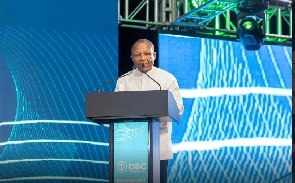 Kwamina Duker, CEO of Development Bank Ghana (DBG)
Kwamina Duker, CEO of Development Bank Ghana (DBG)
Development Bank Ghana (DBG) says it is working to position itself as the best institution for attracting development finance funding into the country through a commitment to responsible and sustainable lending practices.
The bank has also initiated the development of the DBG Green Climate Investment Programme, which aims to provide financing solutions for green and climate-resilient projects, contributing to the nation’s efforts to combat climate change.
Mr Kwamina Duker, the Chief Executive Officer of the DBG, who was speaking at an event organised with the Ghana Association of Banks, said the bank was also strengthening partnerships with PFIs, and promoting sustainable development in Ghana.
“DBG will continue to build on these successes to foster economic growth, job creation, and inclusive development in the upcoming quarters,” he said, adding the bank was working to bring on board more commercial banks to invest in the local economy.
The partnership with more commercial banks, he said, would expand investments and opportunities for the agriculture and manufacturing sector and boost the country’s economy.
“We are expanding our PFI network. We have completed due diligence and are on course to bring onboard Ecobank and Absa as new PFIs this month. DBG will continue to identify and onboard new PFIs to enhance our reach and ability to support SMEs across the country as we seek to have at least 10 PFIs by the end of the year,” he said.
DBG has recently launched a programme to scale up investment in the poultry, rice, maize and soybean value chain.
On DBG’s achievement, Mr Duker said an amount of GH¢600 million has so far been disbursed to small-medium enterprises this year alone.
“We possess the capacity to provide additional loans to back sustainable projects as they are presented to us, demonstrating our unwavering dedication to growing with our partners.”
“The bank will focus on sectors with high growth potential and significant social and environmental impact, such as agribusiness, manufacturing, and low-carbon and climate-resilient investments.”
However, he said, the achievements were not without challenges, including macroeconomic uncertainty.
“The prevailing macroeconomic conditions in Ghana, such as high inflation, currency depreciation, and fiscal constraints, have created an uncertain business environment. This has compelled banks to take a more cautious approach to lending and affected the ability of SMEs to access credit and plan for growth,” he added.
Another challenge is the limited capacity of banks to assess and manage SME risks. Some PFIs lack the necessary expertise and capacity to adequately assess and manage risks associated with lending to SMEs, particularly in sectors like agriculture and manufacturing, resulting in a lower appetite for lending to these segments, affecting DBG’s ability to achieve its lending targets.